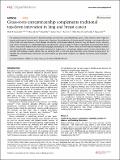Grass-roots entrepreneurship complements traditional top-down innovation in lung and breast cancer
Author(s)
Ramadi, Khalil B.; Mehta, Rhea; He, David; Chao, Sichen; Chu, Zen; Atun, Rifat; Nguyen, Freddy T.; ... Show more Show less
Downloads41746-021-00545-x.pdf (1.082Mb)
Publisher with Creative Commons License
Publisher with Creative Commons License
Creative Commons Attribution
Terms of use
Metadata
Show full item recordAbstract
Abstract
The majority of biomedical research is funded by public, governmental, and philanthropic grants. These initiatives often shape the avenues and scope of research across disease areas. However, the prioritization of disease-specific funding is not always reflective of the health and social burden of each disease. We identify a prioritization disparity between lung and breast cancers, whereby lung cancer contributes to a substantially higher socioeconomic cost on society yet receives significantly less funding than breast cancer. Using search engine results and natural language processing (NLP) of Twitter tweets, we show that this disparity correlates with enhanced public awareness and positive sentiment for breast cancer. Interestingly, disease-specific venture activity does not correlate with funding or public opinion. We use outcomes from recent early-stage innovation events focused on lung cancer to highlight the complementary mechanism by which bottom-up “grass-roots” initiatives can identify and tackle under-prioritized conditions.
Date issued
2022-01-21Department
Massachusetts Institute of Technology. School of Engineering; Sloan School of Management; Massachusetts Institute of Technology. Institute for Medical Engineering & ScienceJournal
npj Digital Medicine
Publisher
Springer Science and Business Media LLC
Citation
Ramadi, K.B., Mehta, R., He, D. et al. Grass-roots entrepreneurship complements traditional top-down innovation in lung and breast cancer. npj Digit. Med. 5, 10 (2022)
Version: Final published version
ISSN
2398-6352